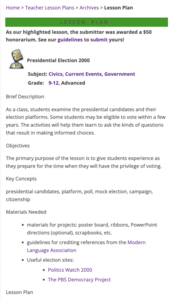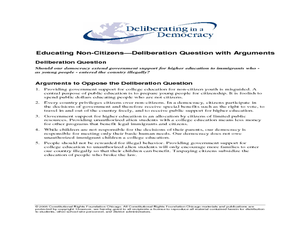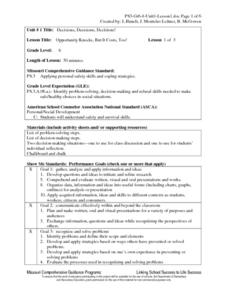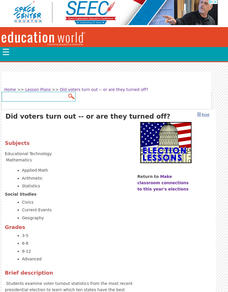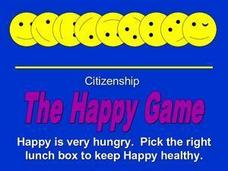Learning for Life
Exhibition Responsible Citizenship
While we hope our children may never have to witness a crime firsthand, give them the tools to recognize what is happening and respond accordingly. These activities help learners sharpen their observation and memory skills, as well...
Center for Civic Education
The Culminating Activity: Simulated Election: Initiatives
In part two of an election simulation, pupils practice actually casting their votes in a simulated polling place in order to prepare for this real-world democratic experience.
Center for Civic Education
Becoming an Informed Voter: Creating Initiatives
Continuing from a previous lesson on how to read and analyze proposed legislation on election ballots, your class members will now practice writing up their own proposals for a new school rule or local ordinance that will be discussed...
Center for Civic Education
Becoming a Voter
What are the requirements to register to vote in the United States? Young citizens evaluate this process by working with handouts, informational texts, discussion, and research, as well as complete a sample voter registration form.
K12 Reader
Responsibilities of Citizenship
Your pupils are all citizens of your classroom. Provide some more instruction on how people can be citizens with the reading passage included here. After reading, learners answer the five related questions.
Curated OER
Daily Progress Report Forms
Focus on an individual's behavior by providing daily feedback. The teacher makes notes each day on the progress page and provides comments before sending the form to a parent or guardian for a signature.
Center for Civic Education
Lesson 3: Becoming a Voter
Who is eligible to vote in your state? Class members examine their states' voting qualifications, complete sample voter registration forms, and chart the elections scheduled.
Center for Civic Education
What Is Authority?
Young scholars examine the concepts of power and authority as they begin learning about government in this elementary social studies lesson. Through a series of readings, discussions, and problem solving activities, children learn about...
Curated OER
Pioneering Principles: Why Character Matters
What does it mean to "be of good character"? What are the qualities that define such a person? The 1825 Colonization Law of Coahuila y Texas required that all new immigrants into Mexican Texas present documentation that they were of good...
iCivics
Students, Engage!
Discuss as a class some problems that you would like to see changed in your school or community, and then take action! After your young citizens determine the appropriate steps they should take to accomplish their objectives, they will...
University of Arkansas
Human Rights
What basic rights are guaranteed to all Americans? Do citizens, legal aliens, illegal aliens, and minors all have the same rights? Should individuals all over the world enjoy the same rights? Class members read the Declaration of...
What So Proudly We Hail
The Meaning of America: National Identity and Why It Matters
Combining a close reading of a classic American text with the study of history can be a very powerful strategy, and this is most certainly the case with this resource using Edward Everett Hale's The Man without a Country. Consider themes...
Curated OER
Campaign Ad Critique
Students analyze current campaign TV ads and literature. They identify the ad by "type." They learn to look beyond the ad to understand its intended purposes and its real content.
Curated OER
Getting Out the Vote: An Election Day Classroom Experiment
Students explore through a hands-on experiment why voting is important. They examine the potential impact of deciding not to vote. They they have the opportunity to vote in a mock presidential election if they choose to.
Curated OER
How Laws Are Made
Learners create a graphic organizer to illustrate the steps elected representatives must take to make a new law. Included: Student work sheet and role-play ideas. Students use their graphic organizers to write a paragraph briefly...
Curated OER
Presidential Election 2000
Students examine the presidential candidates and their election platforms. They further analyze the platforms by creating a chart to determine which candidate most represents his or her beliefs and values.
Curated OER
Labour Behind the Labels - Business Studies and Citizenship
The sociology behind the creation of clothes has become quite the controversial topic these days. In many countries people, children included, are often put to work at almost a slave's wages to produce the clothes that people (like us)...
Deliberating in a Democracy
Educating Non-Citizens
High schoolers distinguish between the privileges of being a U.S. Citizen and privileges that are forfeited if not a U.S. Citizen. For this history lesson, students analyze the rights of people in a democratic society through research,...
Curated OER
Discrimination and Media: Focus on Mental Health
Students explore discrimination by the media. In this media awareness lesson plan, students examine stigmas concerning mental illnesses as they are portrayed in the media.
Curated OER
Opportunity Knocks, But It Costs, Too!
Sixth graders write a reflection piece, outlining each of the decision-making steps they have used and what decision they have decided upon, which includes possible solutions, as well as possible outcomes for each solution. They also...
Curated OER
I Pledge Allegiance
What does showing respect look like? What behaviors show disrespect? After modeling such behaviors, primary graders create a flag that they hold up while demonstrating respectful behavior as they recite the Pledge of Allegiance. The...
Curated OER
Did Voters Turn Out -- or Are They Turned Off?
What was the voter turnout at your last state election? Examine voter turnout statistics from the most recent election to learn which ten states have the best turnout record. This lesson offers election data, handouts, and worksheets.
Curated OER
Happy Game: Citizenship
Play a game to quiz your kids on what they know about citizenship. There are 10 questions that cover topics ranging from responsibility to volunteerism. The game is cute, interactive, and perfect for second through fourth graders.
Curated OER
A River Ran Wild: An Environmental History
The Nashua River serves as the focal point of an investigation of the treatment of and care for natural resources. A reading of A River Rand Wild: An Environmental History by Lynne Cherry, launches the study and class members consider...

















